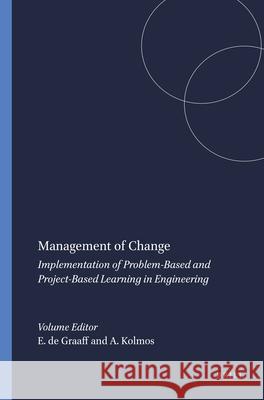Management of Change : Implementation of Problem-Based and Project-Based Learning in Engineering » książka
Management of Change : Implementation of Problem-Based and Project-Based Learning in Engineering
ISBN-13: 9789087900137 / Angielski / Miękka / 2007 / 232 str.
Problem-Based Learning (PBL) and Project-Based Learning are teaching methods based on principles of student-centred learning, which target an interdisciplinary engineering curriculum. The transition from strictly traditional approaches in engineering education represents significant opportunities for change. Currently many engineering institutions in different countries all over the world exploit these opportunities for change as they move from the traditional paradigm towards the techno-science paradigm by implementing project-organised and PBL models. This book addresses the need for more structured information on the implementation process, in particular in existing engineering schools and it aims to put together on overview of examples of the introduction of PBL formats in Engineering. Concrete case histories serve as a basis for inspiration for further development but also deeper insight in the understanding of implementing change.
Problem-Based Learning (PBL) and Project-Based Learning are teaching methods based on principles of student-centred learning, which target an interdisciplinary engineering curriculum. The transition from strictly traditional approaches in engineering education represents significant opportunities for change. Currently many engineering institutions in different countries all over the world exploit these opportunities for change as they move from the traditional paradigm towards the techno-science paradigm by implementing project-organised and PBL models. This book addresses the need for more structured information on the implementation process, in particular in existing engineering schools and it aims to put together on overview of examples of the introduction of PBL formats in Engineering. Concrete case histories serve as a basis for inspiration for further development but also deeper insight in the understanding of implementing change.











